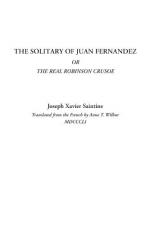It is Coquimbo! he cannot doubt it, and shortening his route by a path across the hill, he quickens his pace.
Meanwhile an east wind arises, the fog disappears; when he thinks he has reached the suburbs of the city, Selkirk sees before him only an irregular assemblage of calcareous stones, crowned with dry herbs, or reddish, arid, angular rocks, flattened at their summits, tessellated with fragments of silex and mica, on which the sun is just pouring his rays; a company of goats, which the mist had condemned to a momentary repose, are bounding here and there, startling flocks of clamorous black-birds and plaintive sea-gulls; the fearless and yellow-crested woodpeckers alone do not stir, but continue to hammer with their sharp beaks at some old stunted trees.
The disenchantment is painful for our sailor; the fog has deceived him with the semblance of a city, as it has more than once deluded us in the midst of plains and woods, by the appearance of an ocean with its white waves, its great capes, its bold shores, and its vessels at anchor.
Perhaps Coquimbo is still beyond. Fearing to lose himself if he ventures farther in an unknown land, he resolves to explore it first by a look. Returning to the shore upon which he had landed, he scales the mountains on the north, reaches the first platform, and from thence seeks to discover some indications of a city. Nothing! he still ascends, the circle enlarges around him, but with no better result. Summoning all his courage, through a thousand difficulties, climbing, drawing himself up by the arid and abrupt rocks, piled one upon another, he at last attains a culminating point of the mountain. He can now embrace with his eye an immense horizon, but this immense horizon is the sea! On his right, on his left, before him, behind him, every where the sea!
He is not on the continent, but on an island.
This evening, exhausted with fatigue, he lies down in a grotto at the foot of the mountain, where he passes a night full of agitation and anxiety.
Rising with the sun, his first care, the next morning, is to examine his riches and his provisions. He returns to the thicket of cactus and aloes.
Besides two guns, two hatchets, a knife, an iron pot, a Bible and nautical instruments, all articles belonging to him, he finds there a quantity of nails, a large fragment of a sail, several horns of powder and shot; a bag of ship biscuit, a salted quarter of pork, a little cask of pickled fish, and a dozen cocoa-nuts.
The night before, at sight of these articles, he had supposed a sentiment of justice and humanity to exist in the soul of the corsair. Just now, he had said to himself that Stradling, deceived by a false reckoning of latitude, had landed him on an island, perhaps believing it to be a projecting shore of the continent. Now, the abundance of his supplies, this biscuit, these salt provisions, these fruits of the cocoa, all valueless if he had really landed at Coquimbo, lead him to suspect that the vindictive Englishman has designedly chosen the place of his exile.




